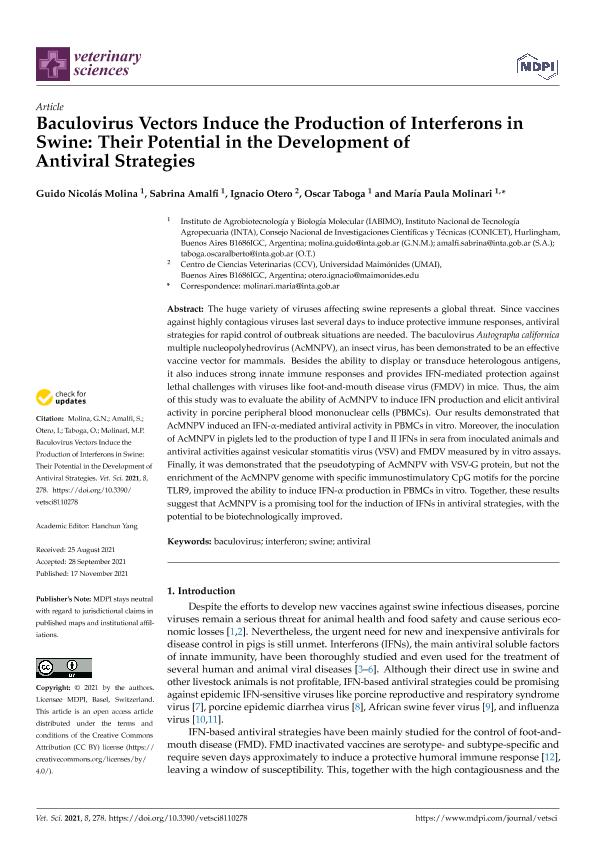Artículo
Baculovirus vectors induce the production of interferons in swine: Their potential in the development of antiviral strategies
Molina, Guido Nicolás ; Amalfi, Sabrina
; Amalfi, Sabrina ; Otero, Ignacio; Taboga, Oscar Alberto
; Otero, Ignacio; Taboga, Oscar Alberto ; Molinari, Maria Paula
; Molinari, Maria Paula
 ; Amalfi, Sabrina
; Amalfi, Sabrina ; Otero, Ignacio; Taboga, Oscar Alberto
; Otero, Ignacio; Taboga, Oscar Alberto ; Molinari, Maria Paula
; Molinari, Maria Paula
Fecha de publicación:
11/2021
Editorial:
Multidisciplinary Digital Publishing Institute
Revista:
Veterinary Sciences
ISSN:
2306-7381
Idioma:
Inglés
Tipo de recurso:
Artículo publicado
Clasificación temática:
Resumen
The huge variety of viruses affecting swine represents a global threat. Since vaccines against highly contagious viruses last several days to induce protective immune responses, antiviral strategies for rapid control of outbreak situations are needed. The baculovirus Autographa californica multiple nucleopolyhedrovirus (AcMNPV), an insect virus, has been demonstrated to be an effective vaccine vector for mammals. Besides the ability to display or transduce heterologous antigens, it also induces strong innate immune responses and provides IFN-mediated protection against lethal challenges with viruses like foot-and-mouth disease virus (FMDV) in mice. Thus, the aim of this study was to evaluate the ability of AcMNPV to induce IFN production and elicit antiviral activity in porcine peripheral blood mononuclear cells (PBMCs). Our results demonstrated that AcMNPV induced an IFN-α-mediated antiviral activity in PBMCs in vitro. Moreover, the inoculation of AcMNPV in piglets led to the production of type I and II IFNs in sera from inoculated animals and antiviral activities against vesicular stomatitis virus (VSV) and FMDV measured by in vitro assays. Finally, it was demonstrated that the pseudotyping of AcMNPV with VSV-G protein, but not the enrichment of the AcMNPV genome with specific immunostimulatory CpG motifs for the porcine TLR9, improved the ability to induce IFN-α production in PBMCs in vitro. Together, these results suggest that AcMNPV is a promising tool for the induction of IFNs in antiviral strategies, with the potential to be biotechnologically improved.
Palabras clave:
ANTIVIRAL
,
BACULOVIRUS
,
INTERFERON
,
SWINE
Archivos asociados
Licencia
Identificadores
Colecciones
Articulos (IABIMO)
Articulos de INSTITUTO DE AGROBIOTECNOLOGIA Y BIOLOGIA MOLECULAR
Articulos de INSTITUTO DE AGROBIOTECNOLOGIA Y BIOLOGIA MOLECULAR
Citación
Molina, Guido Nicolás; Amalfi, Sabrina; Otero, Ignacio; Taboga, Oscar Alberto; Molinari, Maria Paula; Baculovirus vectors induce the production of interferons in swine: Their potential in the development of antiviral strategies; Multidisciplinary Digital Publishing Institute; Veterinary Sciences; 8; 11; 11-2021; 1-14
Compartir
Altmétricas



